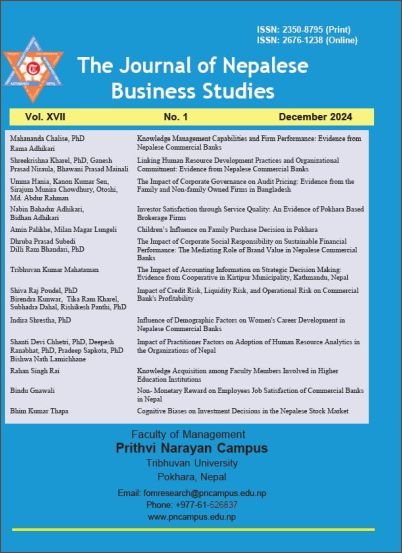Non- Monetary Reward on Employees Job Satisfaction of Commercial Banks in Nepal
DOI:
https://doi.org/10.3126/jnbs.v17i1.75315Keywords:
Capacity building, employees job satisfaction, flexible work schedules, job rotation and transfer, social security, work environmentAbstract
Employees job satisfaction is crucial for both employees and organizations, as employees are considered the backbone and most valuable asset of any organization. Motivated and satisfied employees tend to be more committed and contribute more effectively. In today's dynamic business environment, where organizations face challenges related to employee acquisition and optimization, having satisfied and diligent employees is essential, especially in the banking sector. This study investigates employees job satisfaction among bank staff in Nepal, emphasizing the role of non-monetary rewards and their impact on overall employee satisfaction. The target population includes staff from all 20 commercial banks, with a sample of 200 employees. Data were collected on personal and job-related factors through a structured questionnaire using Google Forms and analyzed with a six-point Likert scale. All variable are reliable. This analysis underscores the critical role of non-monetary rewards in enhancing employee job satisfaction within the banking sector. By focusing on improving the work environment, capability building, social security, and flexible work schedule, banks can foster greater employee satisfaction, ultimately leading to improved performance and retention. The findings highlight the need for strategic interventions in these areas to cultivate a more engaged and satisfied workforce.
Downloads
Downloads
Published
How to Cite
Issue
Section
License
Copyright (c) 2024 Journal of Nepalese Business Studies

This work is licensed under a Creative Commons Attribution 4.0 International License.
This license allows reusers to distribute, remix, adapt, and build upon the material in any medium or format, so long as attribution is given to the creator. The license allows for commercial use.




